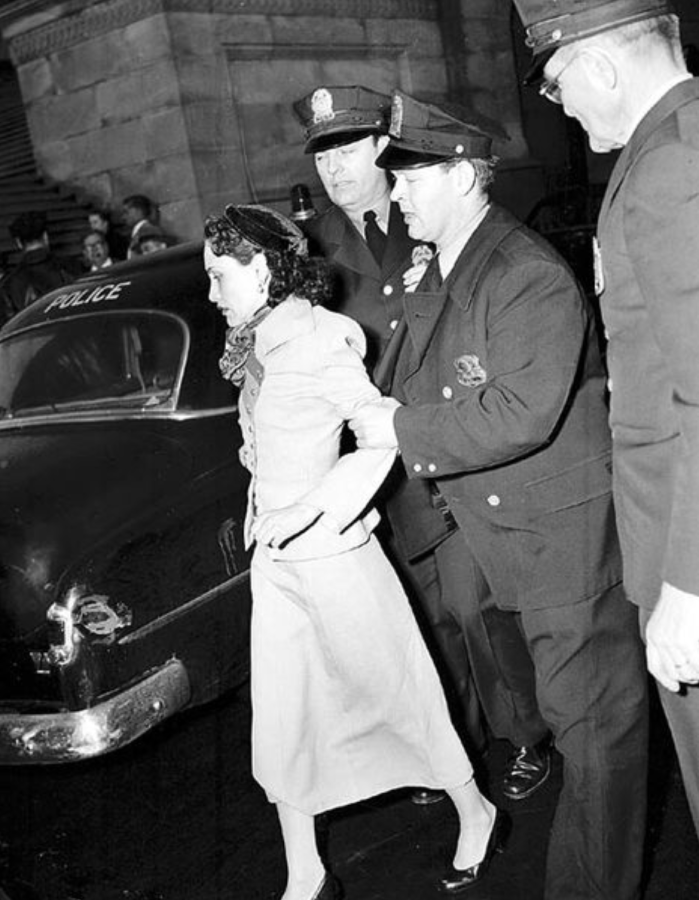What being Latinx means to me
(Library of Congress Prints and Photographs Division Washington, D.C., 20540 USA) I heavily admire and applaud the infamous Lolita Lebrón, a Puerto Rican nacionalista that performed a coup d’etat on American House of Representatives in the name of freeing her country from the regime of an exploitative domination that pushed her home country into poverty. Upon arrest, she is quoted as saying, “Yo no vine a matar a nadie, yo vine a morir por Puerto Rico!” or “I didn’t come here to kill anyone, I came here to die for Puerto Rico!” Lebrón is only ever mentioned as a footnote in history books, but I think her bravery and dedication are worth mentioning much more.
September 26, 2022
I never personally identified with the term “Hispanic.” The definition of Hispanic varies on what website or dictionary you refer to, but I see it to fit those of Spanish descent living as a minority in the United States. I resonate with the term “Latinx,” which is a gender-neutral variant, hence the x, of those of Latin descent residing in the United States. I descend from various places in Latin America — Mexico was given to me by my mom, whereas Peru, specifically indigenous Inkan blood, was given to me by my dad.
My entire life, others felt the need to try to define my latinidad. I lost my ama at a very young age, therefore separating me from all the traditions and cultures I could have inherited from her. Instead, I lived with my Peruana abuela in the whitest neighborhood in Southern California (I don’t know the statistics, but if you look around, all you see is white people at this point). My abuela spoke broken English, and somehow also broken Spanish, so I never really got to learn either from her. As much as she introduced me to the iconic Peruano cultural symbols like Inka Kola, yuca, or fried plantains, I never really felt like I fit where she was trying to place me. I often was called the blanquita of the family because I went to a white school with none of my family.
Amidst the alienation I experienced at home, it was also in the outside world that I felt unaccepted. If I was too white for the brown people, then I was too brown for the white people. I distinctly remember going to Claire’s and trying to find the whitest shade of foundation possible, along with some baby powder, and mixing up a “White-Out” concoction for my skin just to fit in.
People, most often I, would question how I deserved to go to a school amongst those with lawyer fathers and business owner mothers living in million-dollar homes when l had a little two-bedroom home with my handicapped grandma. Don’t get me wrong, I am plenty privileged in my access to education and basic needs of survival, which I am very grateful for, but it was scarce compared to those I went to school with.
Ethnically and sometimes monetarily, I was less privileged than my peers, but I was offered the same opportunities as they were — of course, with some scrutiny. I was always the kid that couldn’t afford those incredibly expensive field trips who had to take assistance from the school. I took the same honors or advanced classes as they did, yet my intelligence was constantly berated. I’ve had too many people ask me if I even spoke English, even considering the fact that I had no distinguishable accent or have lived in the United States my entire life.
When I spent a summer in Tecate, a small border town in Baja California, with my step-family, I was exposed to the roots I was so long ostracized from. I could finally relate to the few Latino and Hispanic primas that did live around. My dominantly Mexican step-family re-educated me on the heritage I lost along with my mom. Tamales being served at Christmas, the elotero, the sweet tang of chamoy y pina, and the cumbia blaring from the guy wheeling the taco cart around. I discovered what I was missing so sorely my entire childhood.
If I could say anything to my young self, unsure of their place in the world, I would tell them to own up to what they have. You have a rich, colorful background dating back thousands of years, and your mere existence is continuing that lineage. Surround yourself with people who have the same skin tone as you. Educate yourself on the matters that concern your people. Speak up twice as loud because you’re half as listened to. And most importantly, never let anyone define you. You are the direct personification of the values you were brought up with, and no one can take that from you.







Amy Tingirides | Oct 1, 2022 at 9:15 pm
This is a great story. I hope you continue to share it with others!
RSS | Sep 30, 2022 at 6:06 pm
Curious. A question to the author. What do folks from the country you or your ancestors are from think of the term “Latinx?”
Viennay Garrido | Nov 4, 2022 at 11:12 am
Hello, this is the author- Sorry for the late response, I just encountered this. I can only speak about the elders from my country, Mexico and Peru, on this matter. Some of them identify as “old-school.” They know that the times will change, and they’re willing to adjust as they can. Yet, of course, considering gender-neutral alternatives are always a little difficult as they have their own indoctrination contrasting the more humanist/socialist values that I am familiar with. I believe that this will change as we encounter new generations of lineage, and eventually, the term will be more widely accepted.
Jim Brusky | Sep 30, 2022 at 6:02 pm
I am so proud that Viennay stepped up and spoke out as a guest reporter for Brush and Palette to provide their personal reflections during National Hispanic Heritage Month. I’m looking forward to reading future pieces Viennay has to contribute.